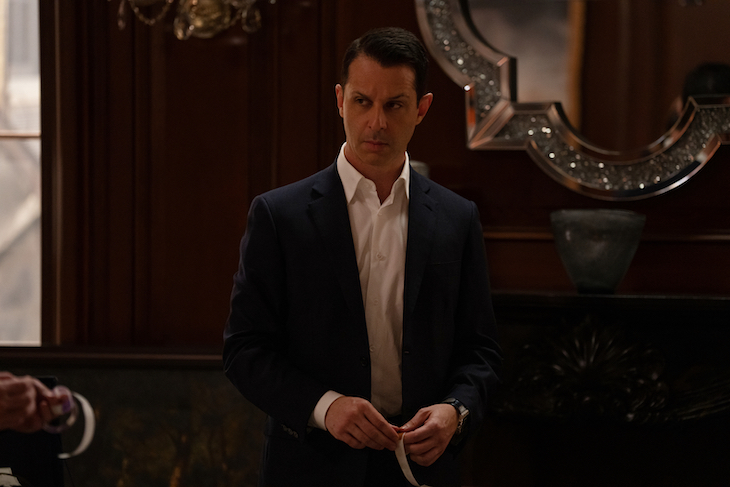It’s strange to reach the end of something you’ve relished with a sense of relief. HBO’s Succession has given me and many others lashings of pleasure, but I was glad as the credits rolled on the final episode. Fascinating though they were, it was satisfying to wave goodbye to the Roys, every one of them both great viewing and utterly repulsive.
One of the many great things about Succession, which makes it almost unique in our stultifying didactic age, is that it didn’t tell the viewer what to think
Like The Iliad, which stops when its stated theme, the anger of Achilles, is over, and never gets to the fall of Troy, Succession ended when the matter of the succession was resolved. We never found out who definitively won the presidential election, if Roman would ever form a functional relationship, if Connor would get his reward, etc. When Shiv made her fateful decision to refuse to crown Kendall as successor, the shutters came down, leaving the viewer reflecting that it couldn’t have ended any other way. The Roys did what they always do – stabbed one another in the back, the front and the sides. They messed each other up and messed themselves up, which is all they’ve ever done. As their father told them at their final encounter, ‘You are not serious people’.
One of the many great things about Succession, which makes it almost unique in our stultifying didactic age, is that it didn’t tell the viewer what to think. It credited its audience with intelligence, assumed we were paying close attention, gave us space to form our own opinions the way all the best fiction does. In the 24 hours since the finale aired I’ve seen summations of it varying from ‘Shiv played a girlboss feminist masterstroke’ to ‘Shiv caved in because she wanted to ensure the future of her unborn child’. We see what we want to see, in life and art.
This all came with peerless writing and casually brilliant performances. (Tom Wambsgans never says a sincere word in 40 episodes, but every genuine emotional reaction registers on Matthew Macfadyen’s crushed face.) But perhaps there was one small flaw.
The Roys – inevitably – live in a political world that is nearly ours, but not quite. Twitter exists, yes, but so does GoJo, a Swedish tech giant.
Republicans and Democrats are there, yes, but Mencken and Jimenez we’ve never heard of. The Murdochs and Fox News don’t exist, instead we have the Roys and ATN. It is in this fictional matrix that there was sometimes a slightly uncomfortable air of unreality.
Thankfully this was mostly kept as backdrop dressing. In contrast, the creators of The Good Wife/Good Fight invented an imaginary scenario that was wildly odd. The Good Wife went from being one of the smartest shows on tv to The Good Fight, one of the dumbest. The bizarre final series of The Good Wife featured the run up to a fictional presidential election campaign with fictional candidates, which was later revealed to have been won by… Donald Trump. Succession never had its cake and ate it in that way, thank God.
It can give you an edgy sensation, watching fictional politics on television. I’m sure we’re all familiar with the sinking sensation one experiences as a viewer when you’re enjoying something and then it drops a stink bomb, filling the air with the whiff of the polytechnic common room; the orthodox ideology of the TV milieu poking through.
Succession’s Fox analogue ATN is often referred to, even by its supporters, as nasty, racist etc. Republican Presidential hopeful Mencken is a fan of Hitler, which is a stupendously silly thing in such an intelligent show. Various references made by Shiv and others that ‘it’s 1933’ and ‘the end of the world’ could be read as satire on progressive hyperbole, and billionaires trying and failing to function in polite society. But there is something off beam here.
The glimpses we get of ATN, in headlines seen fleetingly in the opening title– ‘I smiled at her by the photocopier – now I’m facing chemical castration’ or ‘Illegal Immigrant Accused of Dressing as Neighbour and Stealing Her Job’ – are very funny, but they don’t have the reality of the rest of the show. There is a sense of what British progressive TV writers think the American right is, not what it actually is, a scoffing at little people and their unseemly concerns.
The idea that anyone on the right might be sincere and motivated by genuine motives alongside their self-advancement, or that the big left might be every bit as venal and corrupted as the big right, never arises. The fictional Democrats we meet are either nice (Nate) or at worst passive-aggressively disingenuous (Nan Pierce). The public are spoon-fed drones; the media controls their thoughts and stirs them up to acts of violence like ants. Really? The incidental music in Succession is the only overt authorial voice, and lovely though it was, I could’ve done without it sometimes. It tends to go all doomy when something Republican happens, the same way it did when Kendall left someone to drown or tried to commit suicide.
Thankfully the finale eschewed this dressing. I had a horrible fear that the election story might be building to the making of a corny political statement, but I should’ve had more faith. The conclusion brought the story, and the Roys, back to solid ground – the tortuously inept status games and psychological dysfunction that have rarely been captured so expertly anywhere else.







Comments